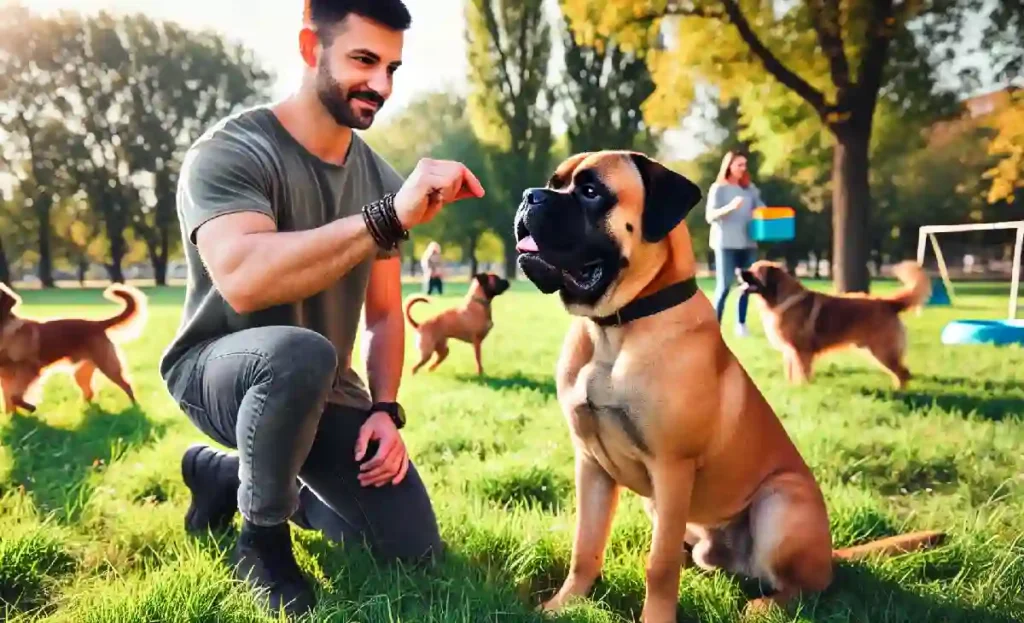The Boerboel, a breed rooted in South African history, is known for its strength, intelligence, and loyalty. This large and muscular dog has served as a guardian of homes and farms for centuries. Their protective instincts, combined with their loving nature, make them unique among dog breeds.
Whether you’re seeking a loyal companion or a dependable protector, the Boerboel offers both in abundance. Let’s find every aspect of this remarkable breed, from its history to care requirements.
What is a Boerboel?
The Boerboel is a large, working dog bred for guarding and protection. Farmers in South Africa developed this breed to protect their families and livestock from predators. Boerboels excel as protectors, but they also shine as family companions due to their gentle nature with those they trust.
This breed is highly intelligent, which makes them easy to train. Their appearance reflects their role as a protector: a large, powerful frame, a broad head, and a confident stance. Boerboels are not just strong; they are loyal and form deep bonds with their families.
History of Boerboels
The history of Boerboels is deeply tied to South Africa’s agricultural past. In the 1600s, Dutch settlers brought mastiff-type dogs to protect their farms. These dogs adapted to the challenging South African climate and bred with local dogs. Over time, the Boerboel emerged as a distinct breed with exceptional guarding abilities.
Farmers relied on Boerboels to keep their property safe from predators like lions and hyenas. The Boerboel’s fearless nature and loyalty made it indispensable. Even today, the Boerboel remains a symbol of strength and dedication.
Boerboel Physical Traits
Boerboels are among the largest and strongest dog breeds. Their powerful build and balanced proportions make them both athletic and imposing.
Size and Weight:
Males typically weigh between 140 and 200 pounds and stand 24 to 27 inches tall. Females are slightly smaller but still large and muscular.
Coat and Colors:
Their short, smooth coat requires minimal grooming. Common coat colors include fawn, brindle, and brown.
Features:
Boerboels have a broad head, a strong jaw, and well-muscled legs. Their almond-shaped eyes express intelligence and confidence.
These physical traits not only make them visually impressive but also equip them for their role as protectors.
Boerboel Temperament
Boerboels are known for their loyalty, intelligence, and protective instincts. These traits make them ideal family guardians. They form strong bonds with their families and will defend them without hesitation. While they remain calm around those they know, they stay alert and watchful around strangers.
Their intelligence makes them responsive to training. Boerboels thrive in structured environments where they understand their role in the family. They are also patient with children, often acting as gentle protectors.
However, their protective nature means they need proper socialization. Early exposure to different people and environments helps them distinguish between real threats and harmless situations.
Training and Socialization for Boerboels

Training and socialization are critical for Boerboels. These dogs are large and strong, so they need guidance to become well-behaved companions. Without proper training, their strength can become difficult to manage.
- Start Early: Begin training when they are puppies. Teach basic commands like sit, stay, and come to establish control.
- Consistency: Use clear commands and stick to them. Consistent training helps them understand expectations.
- Socialization: Introduce your Boerboel to new people, animals, and environments. This exposure reduces fear and aggressive tendencies.
Boerboels respond well to positive reinforcement. Rewards like treats or praise motivate them to learn. Enroll in obedience classes if you need additional support. For tips on training, visit AKC’s training resources.
Common Health Issues in Boerboels
Boerboels are generally healthy, but they are prone to certain genetic conditions. Responsible breeding practices reduce the risk of these issues, but owners should stay informed.
- Hip and Elbow Dysplasia: These joint problems can cause pain and mobility issues. Regular exercise and maintaining a healthy weight help manage symptoms.
- Bloat: This life-threatening condition occurs when the stomach twists. Feed smaller meals throughout the day to reduce the risk.
- Eye Conditions: Boerboels may develop issues like entropion or ectropion. Routine checkups ensure early detection.
- Heart Problems: Cardiomyopathy is a potential concern. Regular vet visits help monitor heart health.
Schedule regular checkups with your veterinarian. Early detection and treatment improve outcomes for most health issues.
Boerboel Care and Maintenance
Caring for a Boerboel involves meeting their physical, mental, and emotional needs. Their size and energy levels require dedicated attention.
Feeding Needs:
Boerboels need a balanced diet to support their large size and active lifestyle. Choose high-quality dog food with the right blend of protein, fat, and nutrients. Avoid overfeeding to prevent obesity, which can strain their joints.
Exercise Requirements:
Daily exercise is essential for Boerboels. They enjoy activities that challenge them physically and mentally. Take them on long walks or runs and engage them in playtime. Interactive toys also help keep their minds active.
Grooming:
Their short coat is low maintenance. Brush it weekly to remove loose hair and maintain its shine. Trim their nails regularly and clean their ears to prevent infections.
Is a Boerboel the Right Dog for You?
Boerboels are not suitable for all households. Their size and protective nature make them best suited for experienced dog owners. They thrive in homes with large yards and require consistent training.
Consider these factors before bringing a Boerboel home:
- Do you have enough space for a large dog?
- Are you confident in training and managing a strong breed?
- Can you dedicate time to exercise and socialization?
If you answer yes, a Boerboel can become a devoted family member and guardian.
FAQs
How long do Boerboels live?
Boerboels live between 9 and 11 years. Proper care and regular checkups help extend their lifespan.
Are Boerboels good family dogs?
Yes, they are loyal and protective, making them excellent family dogs. Early socialization ensures they behave well with children and other pets.
How much exercise do Boerboels need?
Boerboels need at least 1 to 2 hours of exercise daily. This includes walks, playtime, and mental stimulation.
What do Boerboels eat?
Boerboels need a high-quality diet designed for large breeds. Consult your veterinarian for specific feeding recommendations based on their size and activity level.
Do Boerboels bark a lot?
Boerboels bark when necessary, especially to alert their owners to potential threats. They are not excessive barkers.
Conclusion
The Boerboel is a remarkable breed with a rich history, impressive strength, and unwavering loyalty. They excel as protectors and companions, offering love and dedication to their families. While they require training, space, and consistent care, the rewards are immense.
If you’re ready to welcome a Boerboel into your home, ensure you can meet their physical and emotional needs. With the right environment, a Boerboel will become a devoted friend and protector for life.




